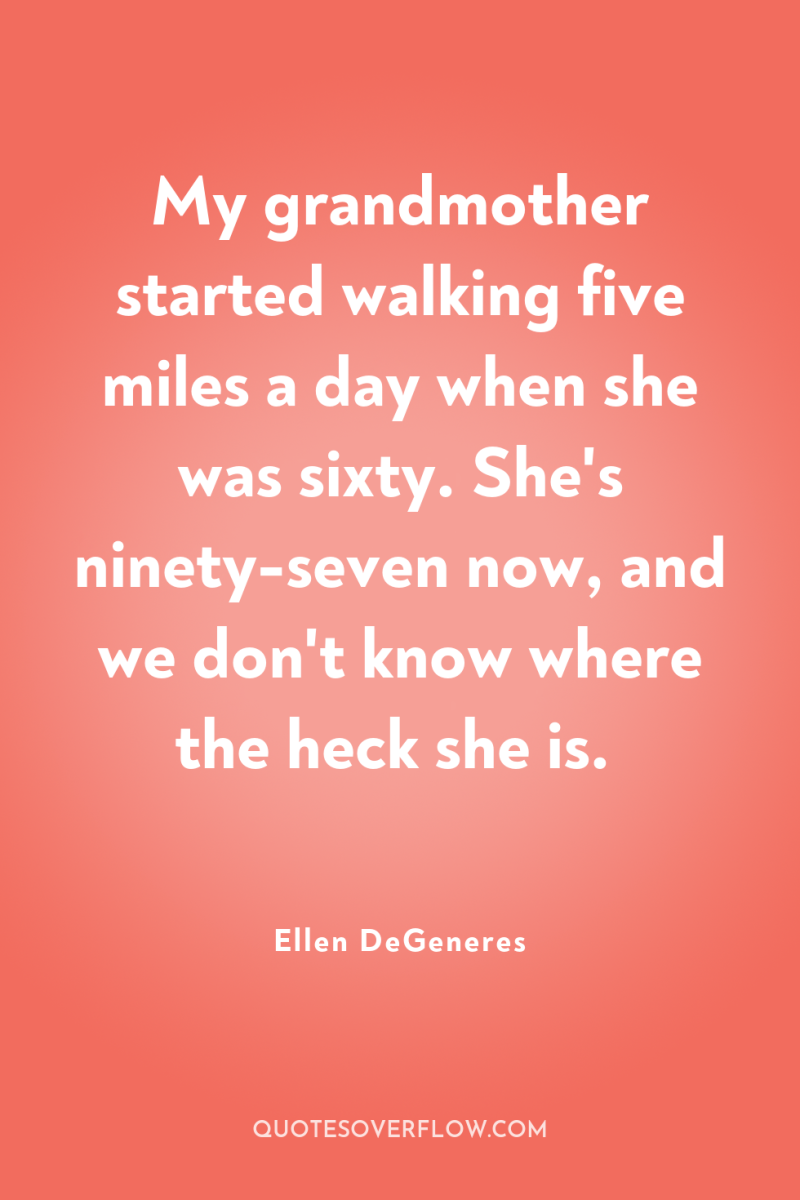
1
My grandmother started walking five miles a day when she was sixty. She's ninety-seven now, and we don't know where the heck she is.Ellen DeGeneres
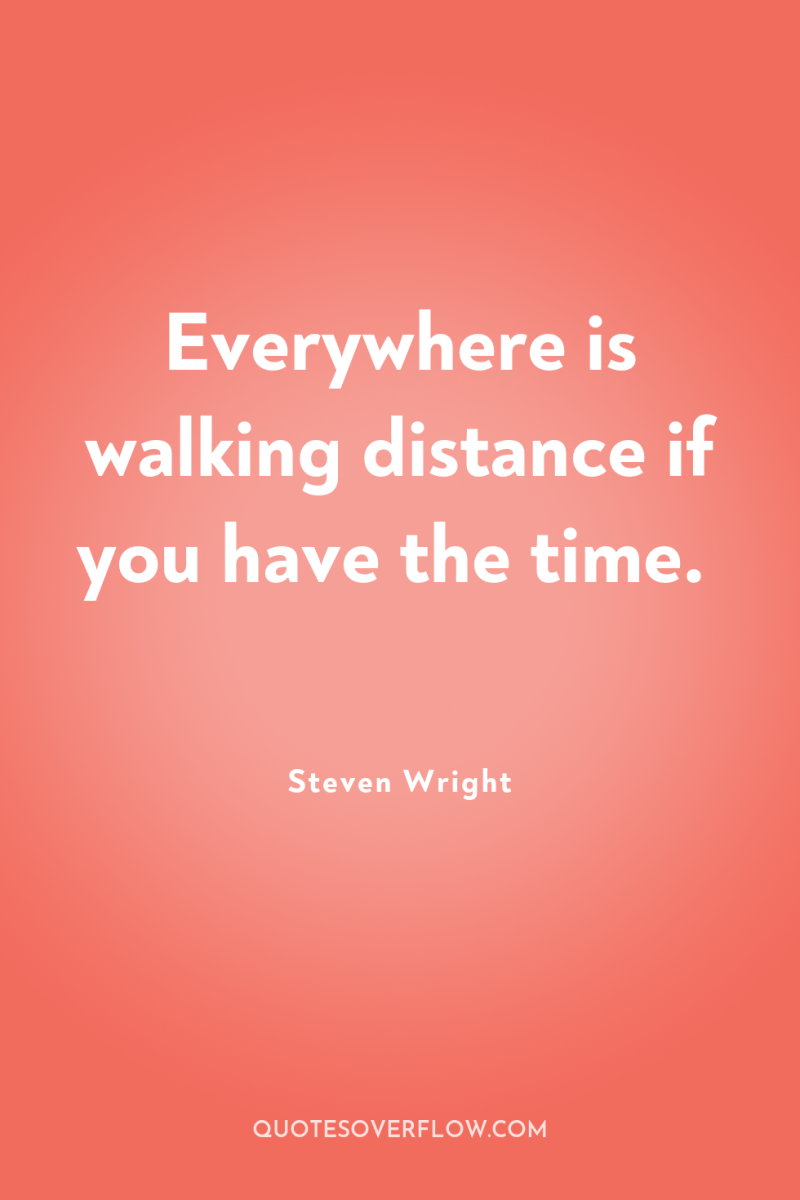
2
Everywhere is walking distance if you have the time.Steven Wright
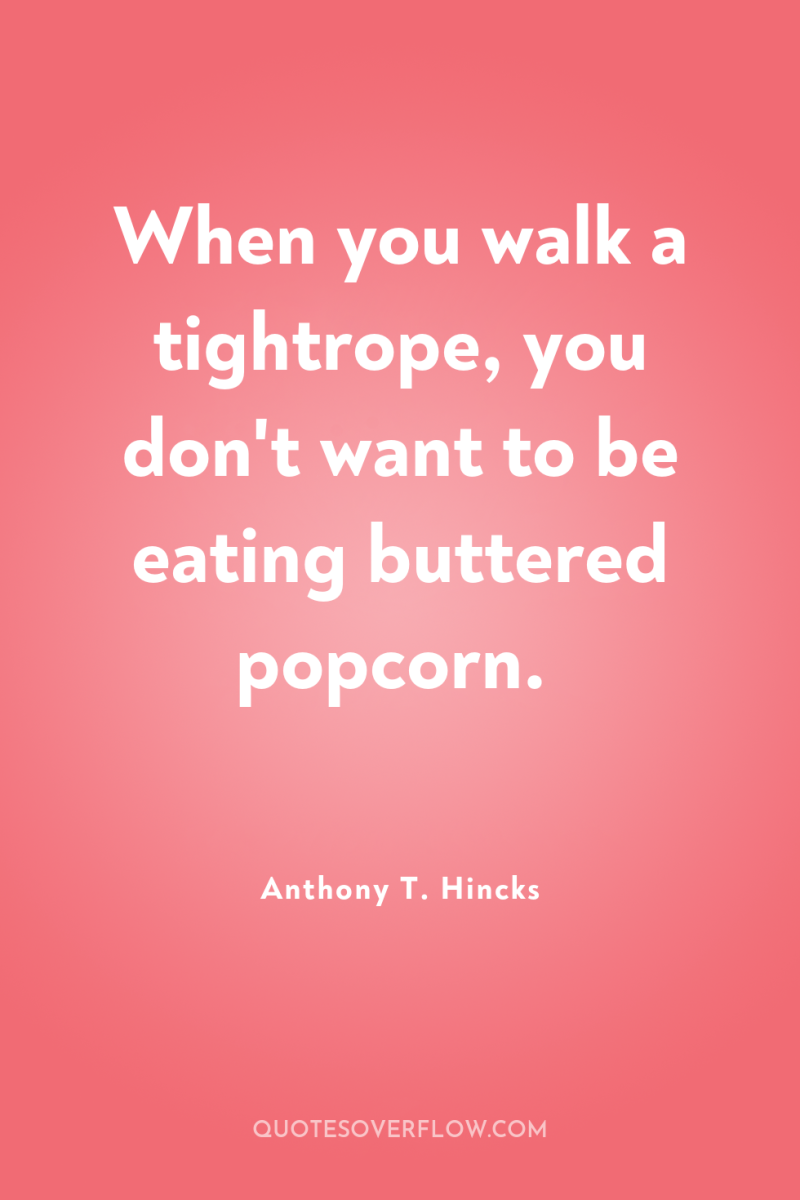
3
When you walk a tightrope, you don't want to be eating buttered popcorn.Anthony T. Hincks
4
They walked on rather aimlessly. He hoped she wouldn't notice he was touched, because he wouldn't have known how to explain why. Here lay the great discrepancy between aesthetic truth and sleazy reality.Patrick White

5
Let your walk be wisely so that you can inspire others to walk wisely!Mehmet Murat Ildan
6
Fairies with gossamer wings, Bring forth beauty, grace and joyful things. Fairies of the earth are caretakers of our soil, water and trees, They watch over beautiful creatures such as bears, bunnies and bees. Fairies ask that you breathe in and appreciate the vantage point from which you stand, Then trod carefully and respectfully with each intentional step you make across this beautiful land.Molly Friedenfeld
7
The average human being is actually quite bad at predicting what he or she should do in order to be happier, and this inability to predict keeps people from, well, being happier. In fact, psychologist Daniel Gilbert has made a career out of demonstrating that human beings are downright awful at predicting their own likes and dislikes. For example, most research subjects strongly believe that another $30, 000 a year in income would make them much happier. And they feel equally strongly that adding a 30-minute walk to their daily routine would be of trivial import. And yet Dr. Gilbert’s research suggests that the added income is far less likely to produce an increase in happiness than the addition of a regular walk.Kerry Patterson
8
Yesterday it was sun outside. The sky was blue and people were lying under blooming cherry trees in the park. It was Friday, so records were released, that people have been working on for years. Friends around me find success and level up, do fancy photo shoots and get featured on big, white, movie screens. There were parties and lovers, hand in hand, laughing perfectly loud, but I walked numbly through the park, round and round, 40 times for 4 hoursjust wanting to make it through the day. There's a weight that inhabits my chest some times. Like a lock in my throat, making it hard to breathe. A little less air got throughand the sky was so blue I couldn’t look at it because it made me sad, swelling tears in my eyes and they dripped quietly on the floor as I got on with my day. I tried to keep my focus, ticked off the to-do list, did my chores. Packed orders, wrote emails, paid bills and rewrote stories, but the panic kept growing, exploding in my chest. Tears falling on the desktick tick tickme not making a soundand some days I just don't know what to do. Where to go or who to see and I try to be gentle, soft and kind, but anxiety eats you up and I just want to be fine. This is not beautiful. This is not useful. You can not do anything with it and it tries to control you, throw you off your balance and lovely waysbut you can not let it. I cleaned up. Took myself for a walk. Tried to keep my eyes on the sky. Stayed away from the alcohol, stayed away from the destructive tools we learn to use. the smoking and the starving, the running, the madness, thinking it will help but it only feeds the fireand I don't want to hurt myself anymore. I made it through and today I woke up, lighter and proud because I'm still here. There are flowers growing outside my window. The coffee is warm, the air is pure. In a few hours I'll be on a train on my way to sing for people who invited me to come, to sing, for them. My own songs, that I created. Me–little me. From nowhere at all. And I have people around that I like and can laugh with, and it's spring again. It will always be spring again. And there will always be a new day.Charlotte Eriksson
9
I thank God every day for this life, and I want there to be more, though that’s not known. What is known is that I’m alive today, this minute. And that’s pretty much what we all have — this day, this moment.Edie Littlefield Sundby
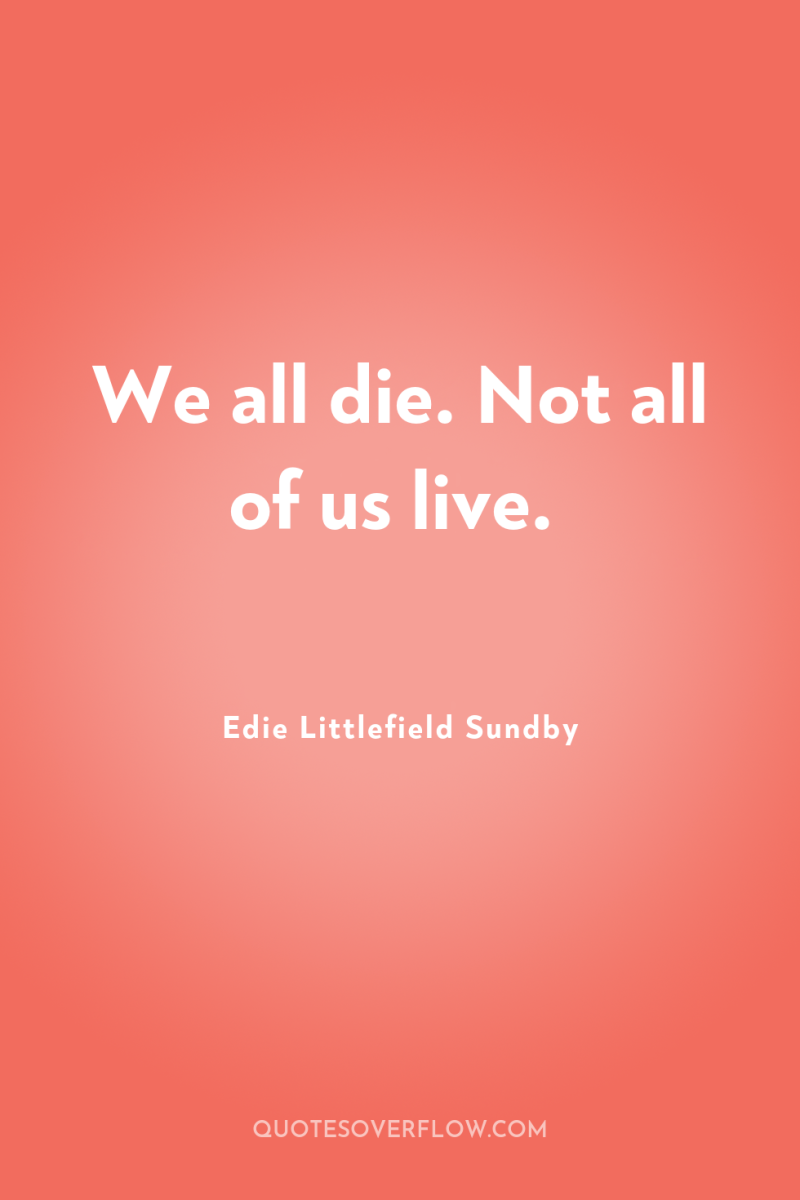
10
We all die. Not all of us live.Edie Littlefield Sundby
11
If I’ve learned anything from facing death, it is that life is not meant to be survived. Life is the greatest adventure there is. And why stop your adventuring when someone says the end may be near? The truth is, we never know when the end will actually come. None of us will avoid it forever. What’s the point in trying? Live fearlessly!Edie Littlefield Sundby
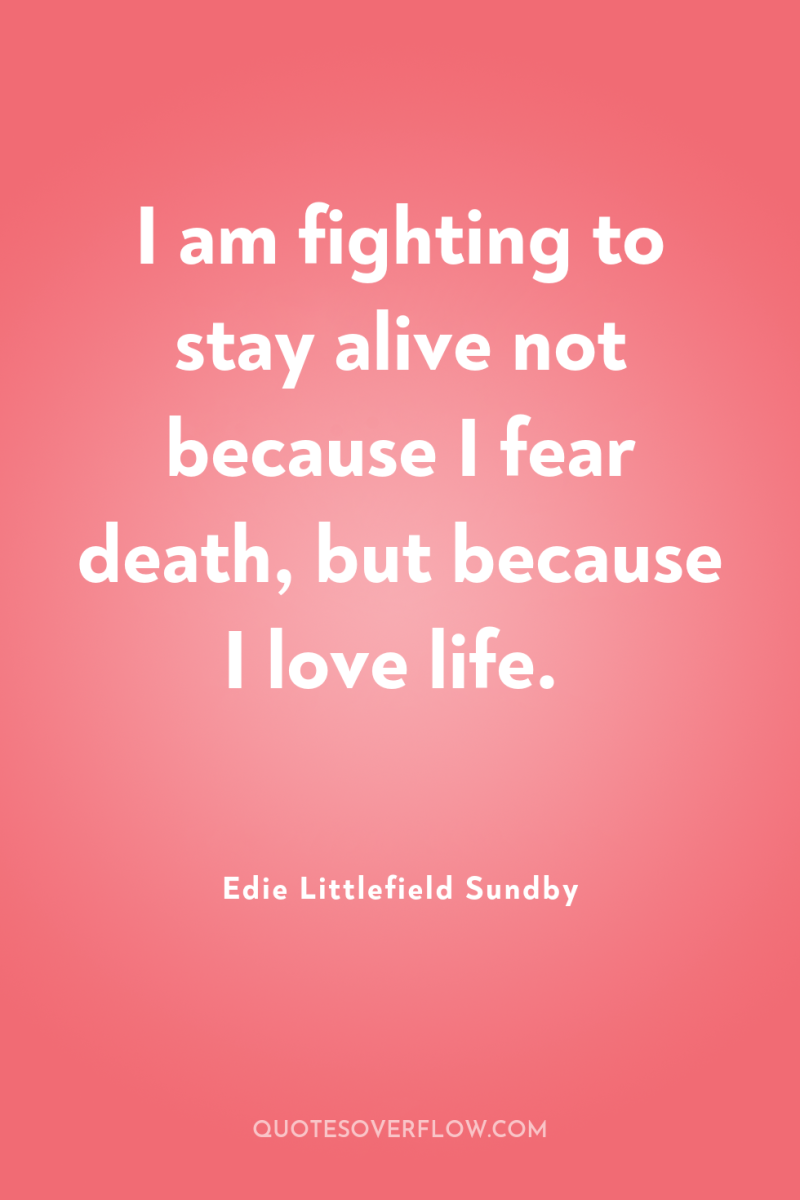
12
I am fighting to stay alive not because I fear death, but because I love life.Edie Littlefield Sundby
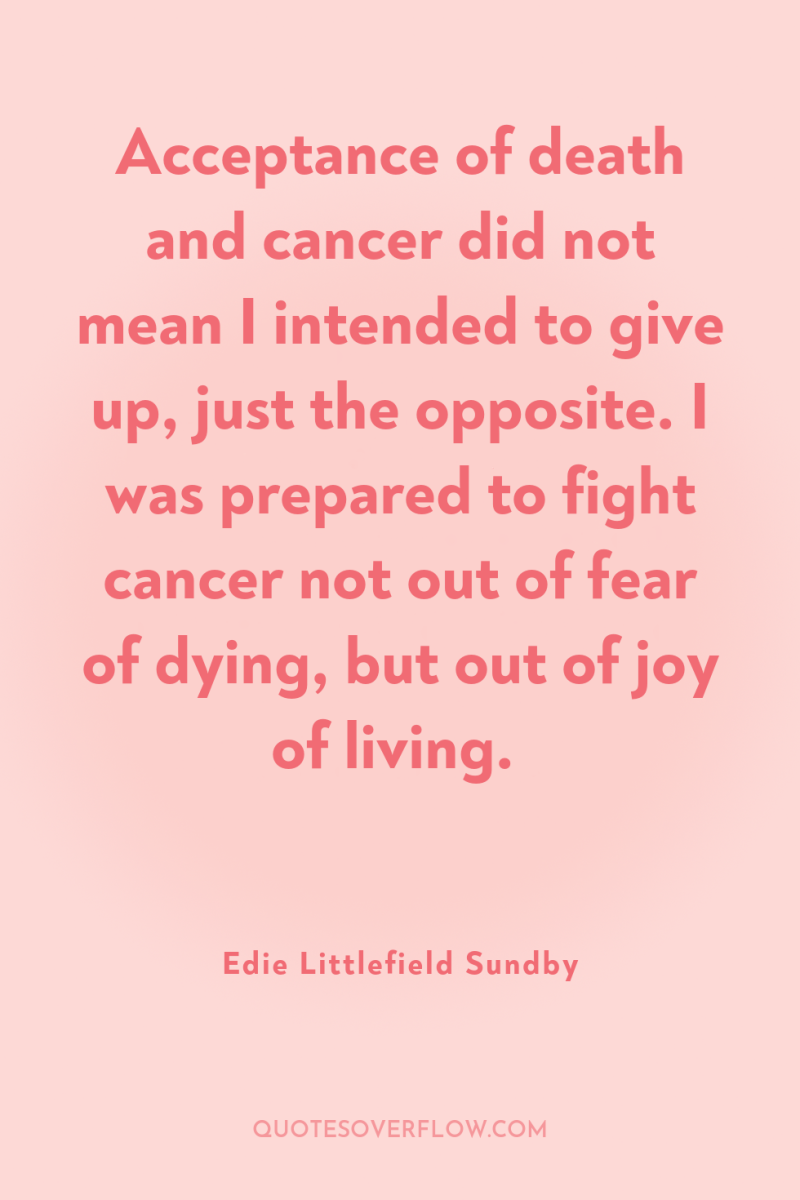
13
Acceptance of death and cancer did not mean I intended to give up, just the opposite. I was prepared to fight cancer not out of fear of dying, but out of joy of living.Edie Littlefield Sundby
14
Through the Grace of God and His medicine I am healed.” The prayer was accompanied by a vision straight out of Braveheart, a line of Scottish Highland warriors in kilts with huge shields and long spears marching in brave unison and attacking and killing the cancer. They were advancing, towards the cancer, striking and killing it with strong accurate thrusts from their sharp spears. The vision was so strong I could hear marching feet, and visibly see the cancer in me dying. “Through the Grace of God and His medicine I am healed, ” became my constant prayer. The prayer awakened with me each day, coming on the wings of the morning. It followed in my heart through the day, and was on my lips as I drifted to sleep at night.Edie Littlefield Sundby
15
When I put down Lance Armstrong’s book, I understood something profoundly. Edie, if you can move, you’re not sick. I decided right then and there that no matter what cancer did to me I would continue to move. Movement was what the physical body was designed to do; it was how it coped and functioned. Movement was vitality. It was life. I would move. Always. No matter what. Until my last breath, I would move. .Edie Littlefield Sundby
16
When I put down Lance Armstrong’s book, I understood something profoundly. Edie, if you can move, you’re not sick. I decided right then and there that no matter what cancer did to me I would continue to move. Movement was what the physical body was designed to do; it was how it coped and functioned. Movement was vitality. It was life. I would move. Always. No matter what. Until my last breath, I would move. .Edie Littlefield Sundby
17
I started to walk the day I was told I was dying of cancer. I believe walking has kept me alive. I live with a constant, pressing awareness of death. Once I start to walk, I am not afraid anymore; all is well.Edie Littlefield Sundby
18
I walk to rid myself of the terror of cancer, and to overcome the fear of it coming back. The fear may never completely fade, but actively engaging life — whatever that may involve — reminds me of the joy each day can bring.Edie Littlefield Sundby
19
I love to walk. Walking is a spiritual journey and a reflection of living. Each of us must determine which path to take and how far to walk; we must find our own way, what is right for one may not be for another. There is no single right way to deal with late stage cancer, to live life or approach death, or to walk an old mission trail.Edie Littlefield Sundby
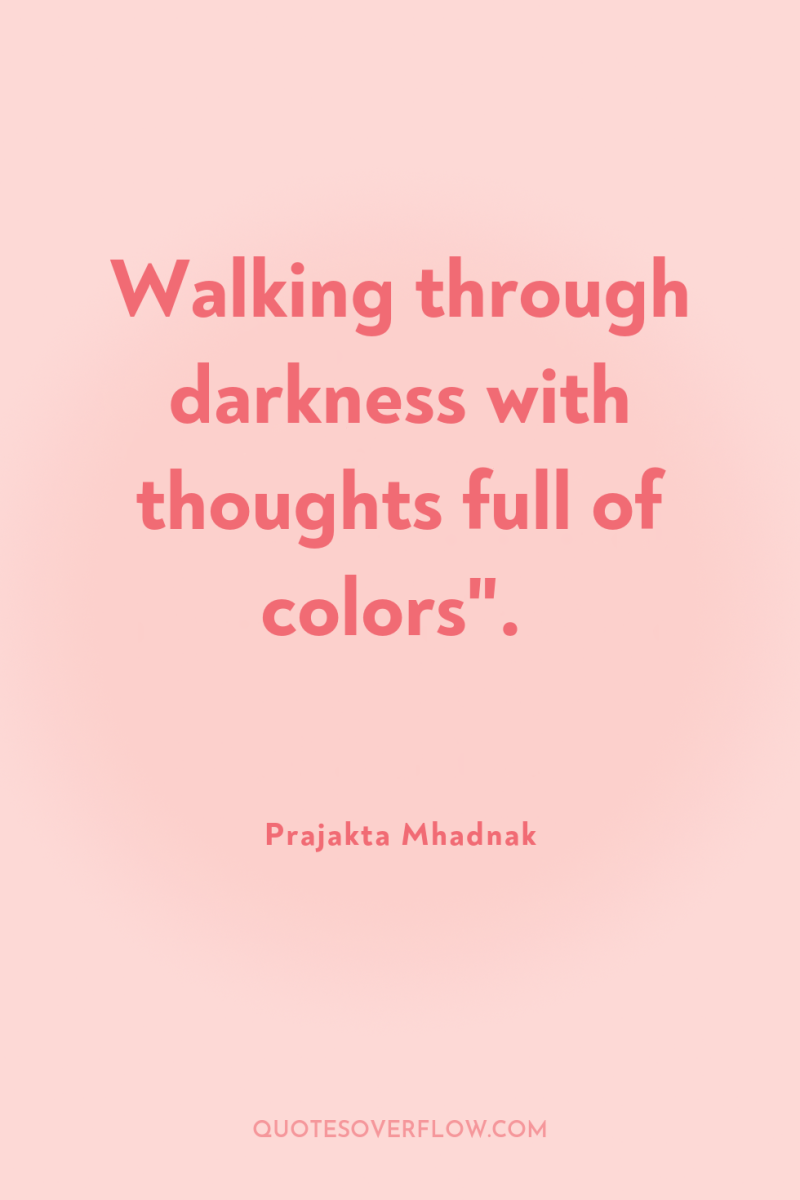
20
Walking through darkness with thoughts full of colors".Prajakta Mhadnak
22
6 months, 2 weeks, 4 days, and I still don’t know which month it was thenor what day it is now. Blurred out linesfrom hangovers to coffee Another vagabond lost to love.4am alone and on my way. These are my finest moments. I scrub my skinto rid me from youand I still don’t know why I cried. It was just something in the way you took my heart and rearranged my insides and I couldn’t recognise the emptiness you left me with when you were done. Maybe you thought my insides would fit better this way, look better this way, to you and us and all the rest. But then you must have changed your mindor made a wrongbecause why did youleave?6 months, 2 weeks, 4 days, and I still don’t know which month it was thenor what day it is now. I replace cafés with crowded bars and empty roads with broken bottlesand this town is healing me slowly but still not slow or fast enough because there’s no right way to do this. There is no right way to do this. There is no right way to do this. .Charlotte Eriksson
23
I would walk along the quais when I had finished work or when I was trying to think something out. It was easier to think if I was walking and doing something or seeing people doing something that they understood.Ernest Hemingway

24
If you seek creative ideas go walking. Angels whisper to a man when he goes fora walk.Raymond I. Myers

25
If you can't write, read. If you can't read, walk. Or walk and read, then write.Joyce Rachelle

26
Solitary walks are great for getting new ideas. It's like you're in a video game and you pick up idea coins on the way.Joyce Rachelle
27
Flying is for the birds, the sugar gliders and the dreamers. Running is for the emus, the ostriches and the optimists. Walking is for the snails, the lame and the cautious explorer. All that is left are those who are afraid of the night, afraid of commitment, afraid of success and afraid of taking a chance in life. Luckily, I love to soar above the clouds, through the heavens, and journey to far distant galaxies and universes.Anthony T. Hincks

28
You have to go head, even if no one goes with you.Lailah Gifty Akita
29
I like walking because it is slow, and I suspect that the mind, like the feet, works at about three miles an hour. If this is so, then modern life is moving faster than the speed of thought or thoughtfulness.Rebecca Solnit
30
We do not belong to those who have ideas only among books, when stimulated by books. It is our habit to think outdoors - walking, leaping, climbing, dancing, preferably on lonely mountains or near the sea where even the trails become thoughtful.Friedrich Nietzsche

31
I wish to walk and keep the ways of GodLailah Gifty Akita
32
The boring thing with taking a walk with someone is that your thoughts are then dictated by the subject or subjects of your conversation and that is made worse by the fact that most sane people are terrified of silence whenever they are with or near someone.Mokokoma Mokhonoana
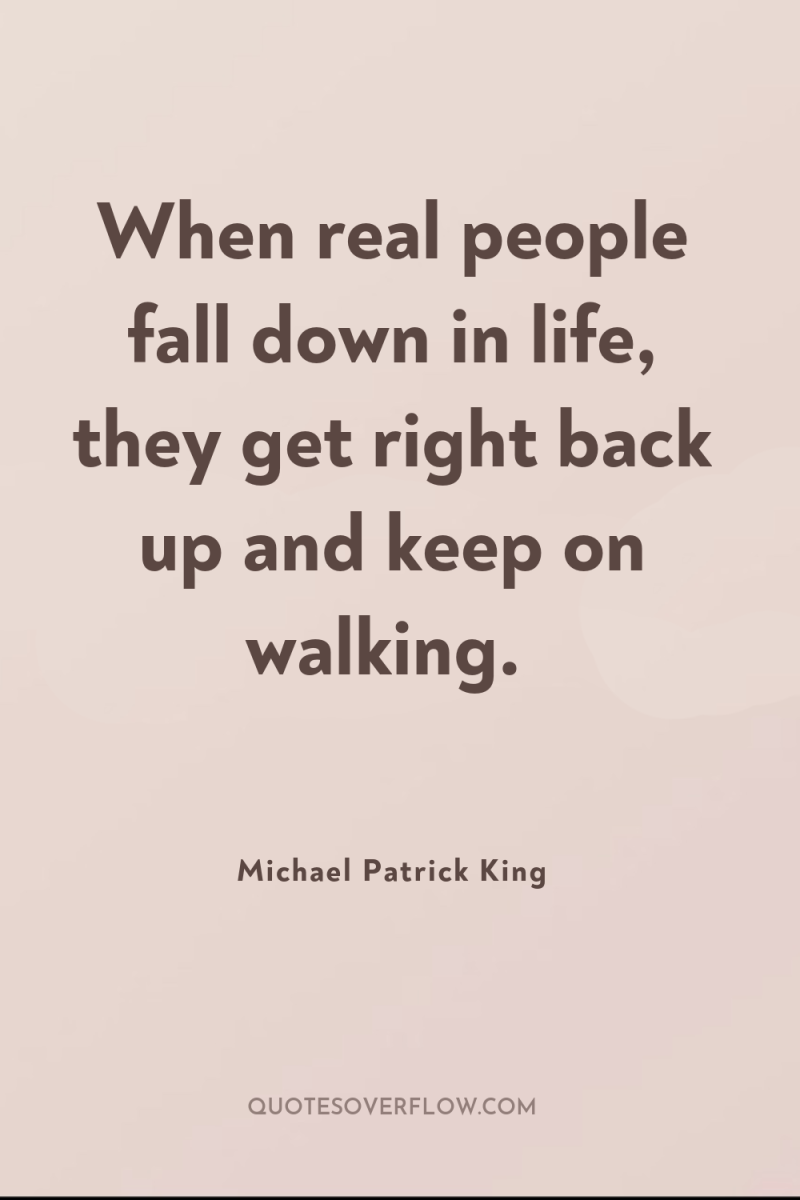
33
When real people fall down in life, they get right back up and keep on walking.Michael Patrick King
34
I’m learning persistence and the closing of doors, the way the seasons come and go as I keep walking on these roads, back and forth, to find myself in new time zones, new arms with new phrases and new goals. And it hurts to become, hurts to find out about the poverty and gaps, the widow and the leavers. It hurts to accept that it hurts and it hurts to learn how easy it is for people to not need other people. Or how easy it is to need other people but that you can never build a home in someone’s arms because they will let go one day and you must build your own. .Charlotte Eriksson
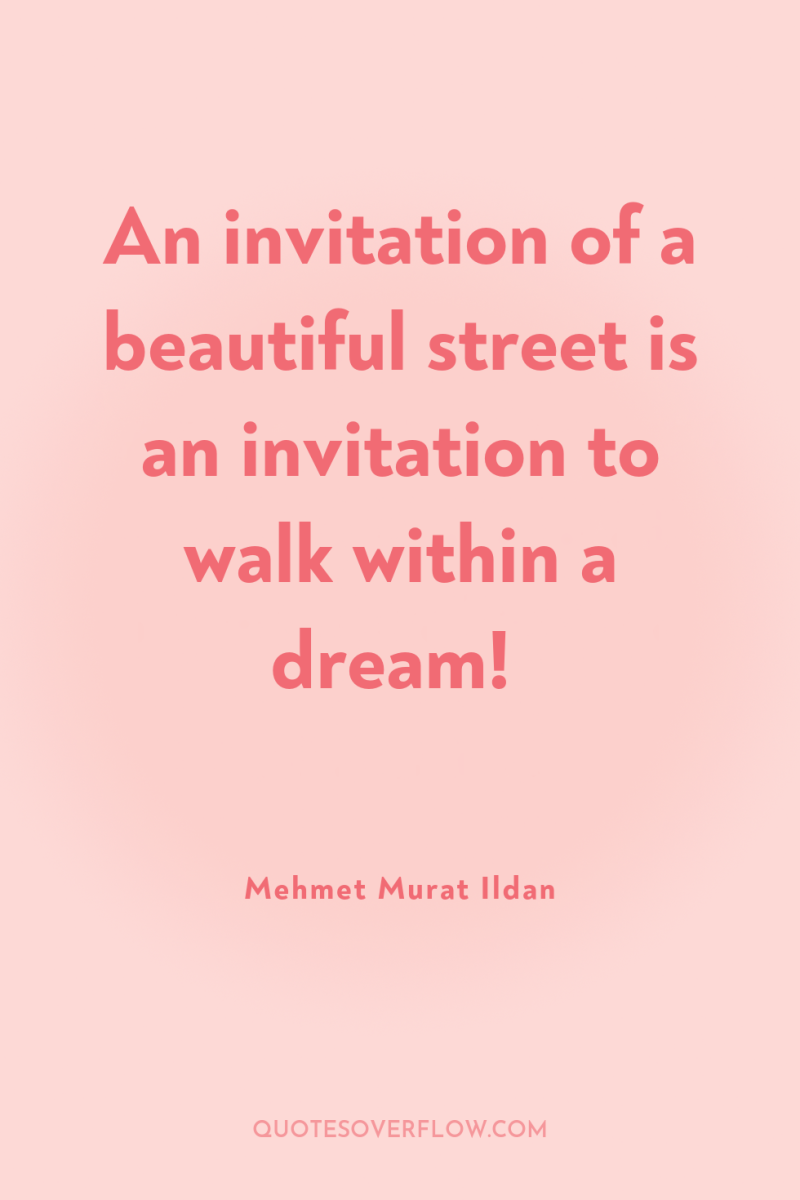
35
An invitation of a beautiful street is an invitation to walk within a dream!Mehmet Murat Ildan
36
One day, it will all make sense, it will all be revealed. Until then, we learn to live and accept our shadows, our Déjà vu's, our dreams, our intuition that takes us to places that our minds never conceived, our bodies only perceived and our souls gladly remembered. Conversations and experiences amuse me, for I am experimenting with my feelings in ways that I can only do down here. Language makes up for a very interesting, yet bizarre way of putting thoughts into spoken form for the sound to move on in other peoples' ears, but every language, every sound, every word carries with it a long history, a deep culture and the souls of the many people who have previously used it throughout the centuries. Our hearts give us direction, hope and the passion to keep moving forward. But what we do when they're frozen, broken, torn apart by an unhealthy way of living is what gives us new strength to push forward or kills us completely. Deep inside, we feed the entities that empower the fight between our internal demons and angels. We feed them with our thoughts, our emotions, our self-talk and the external talk that we lower our shields to at times. Whether good or bad, this brings about a change internally and at times there isn't much we can do to protect ourselves. At times, we need to let things be and go along with it. Of course, we're all worried, stressed, confused and lacking direction at times and we're in the same way at peace, stable and walking in the right direction once we get things sorted. Give it some time, give it some light, give it some love. You're not very far away. .Unknown
37
For [Jane Austen and the readers of Pride and Prejudice], as for Mr. Darcy, [Elizabeth Bennett's] solitary walks express the independence that literally takes the heroine out of the social sphere of the houses and their inhabitants, into a larger, lonelier world where she is free to think: walking articulates both physical and mental freedom.Rebecca Solnit
38
As I went walking I saw a sign there And on the sign it said "No Trespassing."But on the other side it didn't say nothing, That side was made for you and me. This land is your land, this land is my land From California to the New York island From the Redwood forest to the Gulf Stream waters This land was made for you and me.Woody Guthrie
39
The Native Americans, whose wisdom Thoreau admired, regarded the Earth itself as a sacred source of energy. To stretch out on it brought repose, to sit on the ground ensured greater wisdom in councils, to walk in contact with its gravity gave strength and endurance. The Earth was an inexhaustible well of strength: because it was the original Mother, the feeder, but also because it enclosed in its bosom all the dead ancestors. It was the element in which transmission took place. Thus, instead of stretching their hands skyward to implore the mercy of celestial divinities, American Indians preferred to walk barefoot on the Earth: The Lakota was a true Naturist — a lover of Nature. He loved the earth and all things of the earth, the attachment growing with age. The old people came literally to love the soil and they sat or reclined on the ground with a feeling of being close to a mothering power. It was good for the skin to touch the earth and the old people liked to remove their moccasins and walk with bare feet on the sacred earth. Their tipis were built upon the earth and their altars were made of earth. The birds that flew in the air came to rest on the earth and it was the final abiding place of all things that lived and grew. The soil was soothing, strengthening, cleansing and healing. That is why the old Indian still sits upon the earth instead of propping himself up and away from its life-giving forces. For him, to sit or lie upon the ground is to be able to think more deeply and to feel more keenly; he can see more clearly into the mysteries of life and come closer in kinship to other lives about him. Walking, by virtue of having the earth’s support, feeling its gravity, resting on it with every step, is very like a continuous breathing in of energy. But the earth’s force is not transmitted only in the manner of a radiation climbing through the legs. It is also through the coincidence of circulations: walking is movement, the heart beats more strongly, with a more ample beat, the blood circulates faster and more powerfully than when the body is at rest. And the earth’s rhythms draw that along, they echo and respond to each other. A last source of energy, after the heart and the Earth, is landscapes. They summon the walker and make him at home: the hills, the colours, the trees all confirm it. The charm of a twisting path among hills, the beauty of vine fields in autumn, like purple and gold scarves, the silvery glitter of olive leaves against a defining summer sky, the immensity of perfectly sliced glaciers … all these things support, transport and nourish us.Unknown
40
None of your knowledge, your reading, your connections will be of any use here: two legs suffice, and big eyes to see with. Walk alone, across mountains or through forests. You are nobody to the hills or the thick boughs heavy with greenery. You are no longer a role, or a status, not even an individual, but a body, a body that feels sharp stones on the paths, the caress of long grass and the freshness of the wind. When you walk, the world has neither present nor future: nothing but the cycle of mornings and evenings. Always the same thing to do all day: walk. But the walker who marvels while walking (the blue of the rocks in a July evening light, the silvery green of olive leaves at noon, the violet morning hills) has no past, no plans, no experience. He has within him the eternal child. While walking I am but a simple gaze.Unknown
41
Days of slow walking are very long: they make you live longer, because you have allowed every hour, every minute, every second to breathe, to deepen, instead of filling them up by straining the joints…Unknown
42
Slowness means cleaving perfectly to time, so closely that the seconds fall one by one, drop by drop like the steady dripping of a tap on stone. This stretching of time deepens space. It is one of the secrets of walking: a slow approach to landscapes that gradually renders them familiar. Like the regular encounters that deepen friendship.Unknown
43
Walking: it hits you at first like an immense breathing in the ears. You feel the silence as if it were a great fresh wind blowing away clouds. There’s the silence of woodland. Clumps and groves of trees form shifting, uncertain walls around us. We walk along existing paths, narrow winding strips of beaten earth. We quickly lose our sense of direction. That silence is tremulous, uneasy. Then there’s the silence of tough summer afternoon walks across the flank of a mountain, stony paths, exposed to an uncompromising sun.Unknown
44
This time, there’s no question of freeing yourself from artifice to taste simple joys. Instead there is the promise of meeting a freedom head-on as an outer limit of the self and of the human, an internal overflowing of a rebellious Nature that goes beyond you. Walking can provoke these excesses: surfeits of fatigue that make the mind wander, abundances of beauty that turn the soul over, excesses of drunkenness on the peaks, the high passes (where the body explodes). Walking ends by awakening this rebellious, archaic part of us: our appetites become rough and uncompromising, our impulses inspired. Because walking puts us on the vertical axis of life: swept along by the torrent that rushes just beneath us. What I mean is that by walking you are not going to meet yourself. By walking, you escape from the very idea of identity, the temptation to be someone, to have a name and a history. Being someone is all very well for smart parties where everyone is telling their story, it’s all very well for psychologists’ consulting rooms. But isn’t being someone also a social obligation which trails in its wake — for one has to be faithful to the self-portrait — a stupid and burdensome fiction? The freedom in walking lies in not being anyone; for the walking body has no history, it is just an eddy in the stream of immemorial life.Unknown
45
Walking causes a repetitive, spontaneous poetry to rise naturally to the lips, words as simple as the sound of footsteps on the road. There also seems to be an echo of walking in the practice of two choruses singing a psalm in alternate verses, each on a single note, a practice that makes it possible to chant and listen by turns. Its main effect is one of repetition and alternation that St Ambrose compared to the sound of the sea: when a gentle surf is breaking quietly on the shore the regularity of the sound doesn’t break the silence, but structures it and renders it audible. Psalmody in the same way, in the to-and-fro of alternating responses, produces (Ambrose said) a happy tranquillity in the soul. The echoing chants, the ebb and flow of waves recall the alternating movement of walking legs: not to shatter but to make the world’s presence palpable and keep time with it. And just as Claudel said that sound renders silence accessible and useful, it ought to be said that walking renders presence accessible and useful.Unknown
46
An author who composes while walking, on the other hand, is free from such bonds; his thought is not the slave of other volumes, not swollen with verifications, nor weighted with the thought of others. It contains no explanation owed to anyone: just thought, judgement, decision. It is thought born of a movement, an impulse. In it we can feel the body’s elasticity, the rhythm of a dance. It retains and expresses the energy, the springiness of the body. Here is thought about the thing itself, without the scrambling, the fogginess, the barriers, the customs clearances of culture and tradition. The result will not be long and meticulous exegesis, but thoughts that are light and profound. That is really the challenge: the lighter a thought, the more it rises, and becomes profound by rising — vertiginously — above the thick marshes of conviction, opinion, established thought. While books conceived in the library are on the contrary superficial and heavy. They remain on the level of recopying. .Unknown
47
Think while walking, walk while thinking, and let writing be but the light pause, as the body on a walk rests in contemplation of wide open spaces.Unknown
48
The joy of walking and feeling the body advancing ‘like a man alone’; the fullness of feeling alive. And then happiness, before the spectacle of a violet-shadowed valley below the beams of the setting sun, that miracle of summer evenings, when for a few minutes every shade of colour, flattened all day by a steely sun, is brought out at last by the golden light, and breathes. Happiness can come later, at the guesthouse, in the company of others staying there: people met there, happy to find themselves together for a moment through chance. But all of that involves receiving. .Unknown
49
Joy is not the satisfied contemplation of an accomplished result, the emotion of victory, the satisfaction of having succeeded. It is the sign of an energy that is deftly deployed, it is a free affirmation: everything comes easy. Joy is an activity: executing with ease something difficult that has taken time to master, asserting the faculties of the mind and the body. Joys of thought when it finds and discovers, joys of the body when it achieves without effort. That is why joy, unlike pleasure, increases with repetition, and is enriched. When you are walking, joy is a basso continuo. Locally, of course, you may run into effort and difficulty. You will also find immediate moments of contentment: a proud gaze backwards to contemplate the long steep plunge of the slope behind you. Those satisfactions, though, too often present an opportunity to reintroduce quantities, scores, figures (which track? how long? what altitude?). And walking becomes a competition. That is why expeditions in high mountain country (conquering peaks, each one a challenge) are always slightly impure: because they give rise to narcissistic gratification. What dominates in walking, away from ostentation and showing off, is the simple joy of feeling your body in the most primitively natural activity.Unknown
50
When walking in this mode we discover the immense vigour of starry night skies, elemental energies, and our appetites follow: they are enormous, and our bodies are satisfied. When you have slammed the world’s door, there is nothing left to hold you: pavements no longer guide your steps (the path, a hundred thousand times repeated, of the return to the fold). Crossroads shimmer like hesitant stars, you rediscover the tremulous fear of choosing, a vertiginous freedom.Unknown
51
Blinding, mineral, shattering silence. You hear nothing but the quiet crunch of stones underfoot. An implacable, definitive silence, like a transparent death. Sky of a perfectly detached blue. You advance with eyes down, reassuring yourself sometimes with a silent mumbling. Cloudless sky, limestone slabs filled with presence: silence nothing can sidestep. Silence fulfilled, vibrant immobility, tensed like a bow. There’s the silence of early morning. For long routes in autumn you have to start very early. Outside everything is violet, the dim light slanting through red and gold leaves. It is an expectant silence. You walk softly among huge dark trees, still swathed in traces of blue night. You are almost afraid of awakening. Everything whispering quietly. There’s the silence of walks through the snow, muffled footsteps under a white sky. All around you nothing moves. Things and even time itself are iced up, frozen solid in silent immobility. Everything is stopped, unified, thickly padded. A watching silence, white, fluffy, suspended as if in parentheses. .Unknown
52
But just a vibration among the trees and stones, on the paths. Walking to breathe in the landscape. Every step an inspiration born to die immediately, well beyond the oeuvre. I like to walk at my ease, and to stop when I like. A wandering life is what I want. To walk through a beautiful country in fine weather, without being obliged to hurry, and with a pleasant prospect at the end, is of all kinds of life the one most suited to my taste.Unknown
53
But walking causes absorption. Walking interminably, taking in through your pores the height of the mountains when you are confronting them at length, breathing in the shape of the hills for hours at a time during a slow descent. The body becomes steeped in the earth it treads. And thus, gradually, it stops being in the landscape: it becomes the landscape. That doesn’t have to mean dissolution, as if the walker were fading away to become a mere inflection, a footnote. It’s more a flashing moment: sudden flame, time catching fire. And here, the feeling of eternity is all at once that vibration between presences. Eternity, here, in a spark.Unknown
54
Thoreau: ‘The West of which I speak is but another name for the Wild; and what I have been preparing to say is, that in Wildness is the preservation of the world.’ That is why walking leads to a total loss of interest in what is called — laughably no doubt — the ‘news’, one of whose main features is that it becomes old as soon as it is uttered. Once caught in the rhythm, Thoreau says, you are on the treadmill: you want to know what comes next. The real challenge, though, is not to know what has changed, but to get closer to what remains eternally new. So you should replace reading the morning papers with a walk. News items replace one another, become mixed up together, are repeated and forgotten. But the truth is that as soon as you start walking, all that noise, all those rumours, fade out. What’s new? Nothing: the calm eternity of things, endlessly renewed. .Unknown
55
You lift your head, you’re on your way, but really just to be walking, to be out of doors. That’s it, that’s all, and you’re there. Outdoors is our element: the exact sensation of living there.Unknown
56
Perhaps the itinerant monks called ‘Gyrovagues’ were especially responsible for promoting this view of our condition as eternal strangers. They journeyed ceaselessly from monastery to monastery, without fixed abode, and they haven’t quite disappeared, even today: it seems there are still a handful tramping Mount Athos. They walk for their entire lives on narrow mountain paths, back and forth on a long repeated round, sleeping at nightfall wherever their feet have taken them; they spend their lives murmuring prayers on foot, walk all day without destination or goal, this way or that, taking branching paths at random, turning, returning, without going anywhere, illustrating through endless wandering their condition as permanent strangers in this profane world.Unknown
57
When one has walked a long way to reach the turning in the path that discloses an anticipated view, and that view appears, there is always a vibration of the landscape. It is repeated in the walker’s body. The harmony of the two presences, like two strings in tune, each feeding off the vibration of the other, is like an endless relaunch. Eternal Recurrence is the unfolding in a continuous circle of the repetition of those two affirmations, the circular transformation of the vibration of the presences. The walker’s immobility facing that of the landscape … it is the very intensity of that co-presence that gives birth to an indefinite circularity of exchanges: I have always been here, tomorrow, contemplating this landscape.Unknown
58
Forest paths — flat labyrinths — and gentle plains invite the walker’s body to softness, to languor. And memories arise like eddying mists. The air is more bracing with Nietzsche, and above all sharp, transparent. The thought is trenchant, the body wide awake, trembling.Unknown
59
Zhuang Zhu also meant that the feet as such are small pieces of space, but their vocation (‘walking’) is to articulate the world’s space. The size of the foot, the gap between the legs, have no role, are never lined up anywhere. But they measure all the rest. Our feet form a compass that has no useful function, apart from evaluating distance. The legs survey. Their stride constitutes a serviceable measurement.Unknown
60
In the history of walking, many experts considering him (Wordsworth) the authentic originator of the long expedition. He was the first — at a time (the late eighteenth century) when walking was the lot of the poor, vagabonds and highwaymen, not to mention travelling showmen and pedlars — to conceive of the walk as a poetic act, a communion with Nature, fulfilment of the body, contemplation of the landscape. Christopher Morley wrote of him that he was ‘one of the first to use his legs in the service of philosophy’.Unknown
61
And as we know from the pilgrimage diaries of Swami Ramdas, it is when we renounce everything that everything is given to us, in abundance. Everything: meaning the intensity of presence itself.Unknown
62
If I could walk one week, why not six? If I could walk to London, why not to Paris, to the Alps, to Jerusalem..I would show with money and a pair of strong boots you can get to Rome. Good-bye, all ye vampires of modern travel. Good-bye, insistent cab-men, and tip-loving porters. Good-bye, mis-directed luggage and dusty railway carriages.. Good-bye, trains - punctual and unpunctual, I am your slave no longer. I am free. I am FREE. .A.N. Cooper
63
Phileas Fogg, having shut the door of his house at half-past eleven, and having put his right foot before his left five hundred and seventy-five times, and his left foot before his right five hundred and seventy-six times, reached the Reform ClubJules Verne
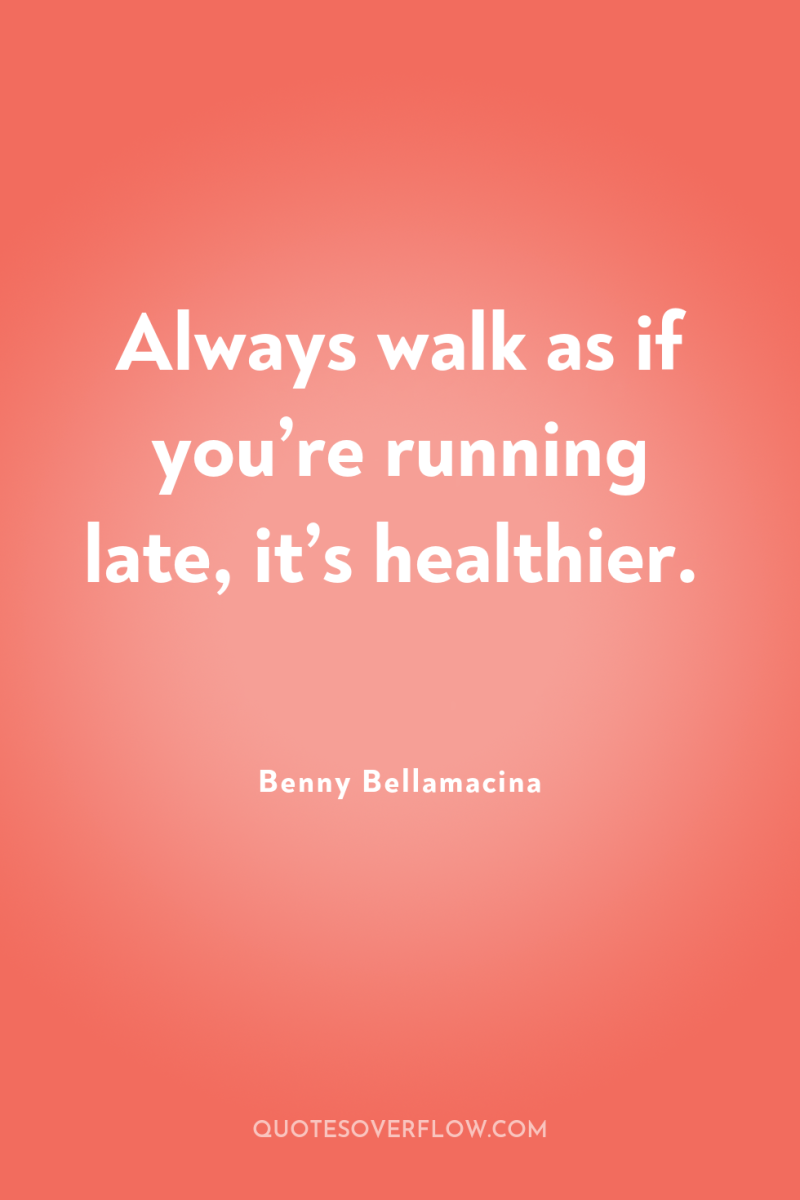
64
Always walk as if you’re running late, it’s healthier.Benny Bellamacina

65
Walking through life, we spend most of our energy choosing the right shoes.Ljupka Cvetanova

66
Becoming God’s reflection first in our private life and walking before God creates a wonderful platform for us to be eligible to change a whole nation for GodSunday Adelaja
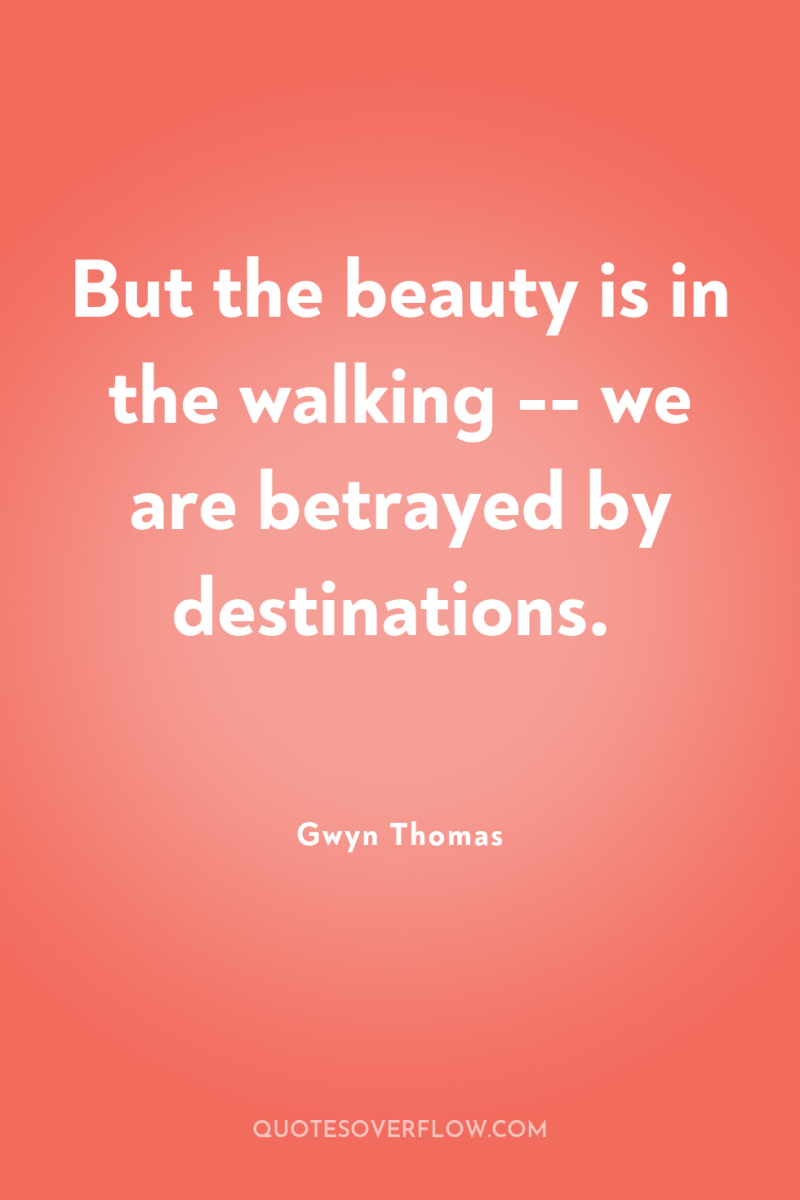
67
But the beauty is in the walking -- we are betrayed by destinations.Gwyn Thomas
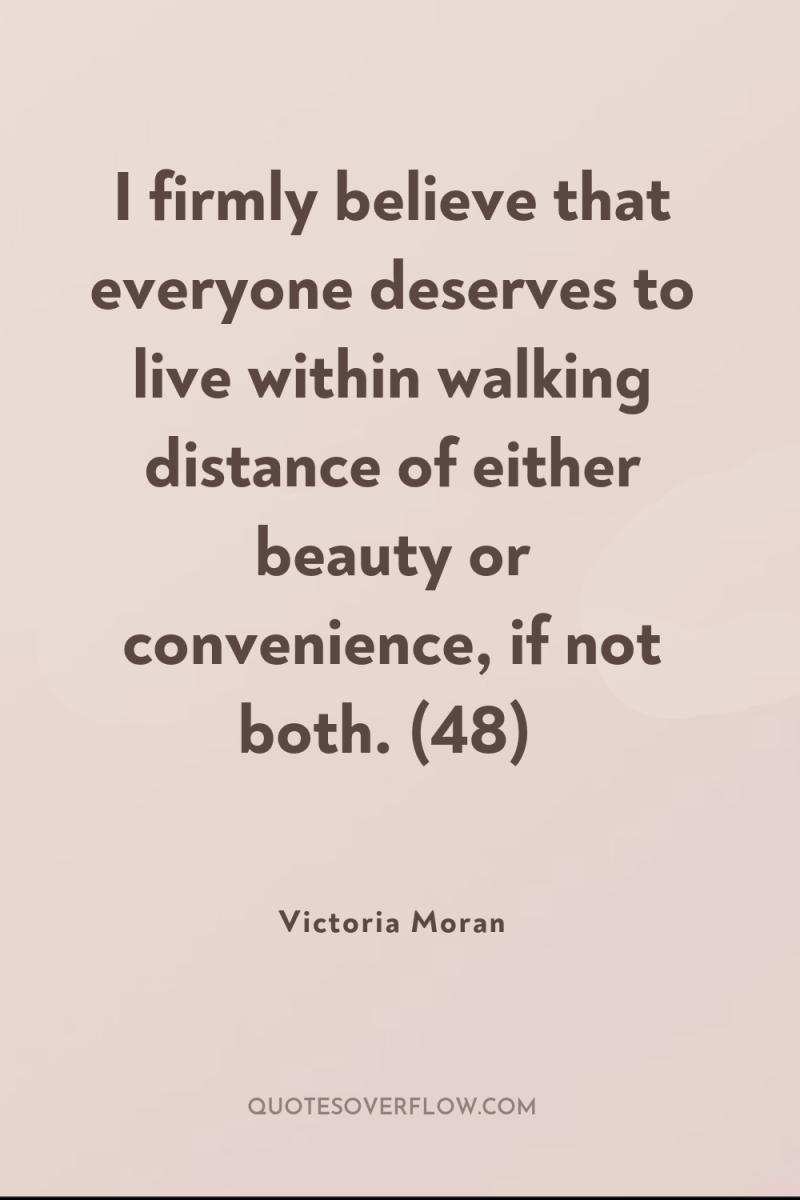
68
I firmly believe that everyone deserves to live within walking distance of either beauty or convenience, if not both. (48)Victoria Moran
69
A kind of northing is what I wish to accomplish, a single-minded trek towards that place where any shutter left open to the zenith at night will record the wheeling of all the sky’s stars as a pattern of perfect, concentric circles. I seek a reduction, a shedding, a sloughing off. At the seashore you often see a shell, or fragment of a shell, that sharp sands and surf have thinned to a wisp. There is no way you can tell what kind of shell it had been, what creature it had housed; it could have been a whelk or a scallop, a cowrie, limpet, or conch. The animal is long since dissolved, and its blood spread and thinned in the general sea. All you hold in your hand is a cool shred of shell, an inch long, pared so thin that it passes a faint pink light. It is an essence, a smooth condensation of the air, a curve. I long for the North where unimpeded winds would hone me to such a pure slip of bone. But I’ll not go northing this year. I’ll stalk that floating pole and frigid air by waiting here. I wait on bridges; I wait, struck, on forest paths and meadow’s fringes, hilltops and banksides, day in and day out, and I receive a southing as a gift. The North washes down the mountains like a waterfall, like a tidal wave, and pours across the valley; it comes to me. It sweetens the persimmons and numbs the last of the crickets and hornets; it fans the flames of the forest maples, bows the meadow’s seeded grasses and pokes it chilling fingers under the leaf litter, thrusting the springtails and the earthworms deeper into the earth. The sun heaves to the south by day, and at night wild Orion emerges looming like the Specter over Dead Man Mountain. Something is already here, and more is coming.Annie Dillard
70
I have often noticed that these things, which obsess me, neither bother nor impress other people even slightly. I am horribly apt to approach some innocent at a gathering, and like the ancient mariner, fix him with a wild, glitt’ring eye and say, “Do you know that in the head of the caterpillar of the ordinary goat moth there are two hundred twenty-eight separate muscles?” The poor wretch flees. I am not making chatter; I mean to change his life.Annie Dillard
71
All at once, something wonderful happened, although at first, it seemed perfectly ordinary. A female goldfinch suddenly hove into view. She lighted weightlessly on the head of a bankside purple thistle and began emptying the seedcase, sowing the air with down. The lighted frame of my window filled. The down rose and spread in all directions, wafting over the dam’s waterfall and wavering between the tulip trunks and into the meadow. It vaulted towards the orchard in a puff; it hovered over the ripening pawpaw fruit and staggered up the steep faced terrace. It jerked, floated, rolled, veered, swayed. The thistle down faltered down toward the cottage and gusted clear to the woods; it rose and entered the shaggy arms of pecans. At last it strayed like snow, blind and sweet, into the pool of the creek upstream, and into the race of the creek over rocks down. It shuddered onto the tips of growing grasses, where it poised, light, still wracked by errant quivers. I was holding my breath. Is this where we live, I thought, in this place in this moment, with the air so light and wild? The same fixity that collapses stars and drives the mantis to devour her mate eased these creatures together before my eyes: the thick adept bill of the goldfinch, and the feathery coded down. How could anything be amiss? If I myself were lighter and frayed, I could ride these small winds, too, taking my chances, for the pleasure of being so purely played. The thistle is part of Adam’s curse. “Cursed is the ground for thy sake, in sorrow shalt thou eat of it; thorns also and thistles shall it bring forth to thee.” A terrible curse: But does the goldfinch eat thorny sorrow with the thistle or do I? If this furling air is fallen, then the fall was happy indeed. If this creekside garden is sorrow, then I seek martyrdom. I was weightless; my bones were taut skins blown with buoyant gas; it seemed that if I inhaled too deeply, my shoulders and head would waft off. Alleluia. .Annie Dillard
72
Today is the winter solstice. The planet tilts just so to its star, lists and holds circling in a fixed tension between veering and longing, and spins helpless, exalted, in and out of that fleet blazing touch. Last night Orion vaulted and spread all over the sky, pagan and lunatic, his shoulder and knee on fire, his sword three suns at the ready-for what? I won’t see this year again, not again so innocent; and longing wrapped round my throat like a scarf. “For the Heavenly Father desires that we should see, ” says Ruysbroeck, “and that is why He is ever saying to our inmost spirit one deep unfathomable word and nothing else.” But what is the word? Is this mystery or coyness? A cast-iron bell hung from the arch of my rib cage; when I stirred, it rang, or it tolled, a long syllable pulsing ripples up my lungs and down the gritty sap inside my bones, and I couldn’t make it out; I felt the voiced vowel like a sigh or a note but I couldn’t catch the consonant that shaped it into sense. .Annie Dillard
73
It is winter proper; the cold weather, such as it is, has come to stay. I bloom indoors in the winter like a forced forsythia; I come in to come out. At night I read and write, and things I have never understood become clear; I reap the harvest of the rest of the year’s planting. The woods are acres of sticks: I could walk to the Gulf of Mexico in a straight line. When the leaves fall, the striptease is over; things stand mute and revealed. Everywhere skies extend, vistas deepen, walls become windows, doors open.Annie Dillard
74
In the forty minutes I watched the muskrat, he never saw me, smelled me, or heard me at all. When he was in full view of course I never moved except to breathe. My eyes would move, too, following his, but he never noticed. Only once, when he was feeding from the opposite bank about eight feet away did he suddenly rise upright, all alert- and then he immediately resumed foraging. But he never knew I was there. I never knew I was there, either. For that forty minutes last night I was as purely sensitive and mute as a photographic plate; I received impressions, but I did not print out captions. My own self-awareness had disappeared; it seems now almost as though, had I been wired to electrodes, my EEG would have been flat. I have done this sort of thing so often that I have lost self-consciousness about moving slowly and halting suddenly. And I have often noticed that even a few minutes of this self-forgetfulness is tremendously invigorating. I wonder if we do not waste most of our energy just by spending every waking minute saying hello to ourselves. Martin Buber quotes an old Hasid master who said, “When you walk across the field with your mind pure and holy, then from all the stones, and all growing things, and all animals, the sparks of their souls come out and cling to you, and then they are purified and become a holy fire in you.Annie Dillard
75
The color-patches of vision part, shift, and reform as I move through space in time. The present is the object of vision, and what I see before me at any given second is a full field of color patches scattered just so. The configuration will never be repeated. Living is moving; time is a live creek bearing changing lights. As I move, or as the world moves around me, the fullness of what I see shatters. “Last forever! ” Who hasn’t prayed that prayer? You were lucky to get it in the first place. The present is a freely given canvas. That it is constantly being ripped apart and washed downstream goes without saying; it is a canvas, nevertheless. But there is more to the present than a series of snapshots. We are not merely sensitized film; we have feelings, a memory for information and an eidetic memory for the imagery of our pasts. Our layered consciousness is a tiered track for an unmatched assortment of concentrically wound reels. Each one plays out for all of life its dazzle and blur of translucent shadow-pictures; each one hums at every moment its own secret melody in its own unique key. We tune in and out. But moments are not lost. Time out of mind is time nevertheless, cumulative, informing the present. From even the deepest slumber you wake with a jolt- older, closer to death, and wiser, grateful for breath. But time is the one thing we have been given, and we have been given to time. Time gives us a whirl. We keep waking from a dream we can’t recall, looking around in surprise, and lapsing back, for years on end. All I want to do is stay awake, keep my head up, prop my eyes open, with toothpicks, with trees.Annie Dillard
76
Xerxes, I read, ‘halted his unwieldy army for days that he might contemplate to his satisfaction’ the beauty of a single sycamore. You are Xerxes in Persia. Your army spreads on a vast and arid peneplain…you call to you all your sad captains, and give the order to halt. You have seen the tree with the lights in it, haven’t you? You must have. Xerxes buffeted on a plain, ambition drained in a puff. Your men are bewildered…there is nothing to catch the eye in this flatness, nothing but a hollow, hammering sky, a waste of sedge in the lee of windblown rocks, a meager ribbon of scrub willow tracing a slumbering watercourse…and that sycamore. You saw it; you will stand rapt and mute, exalted, remembering or not remembering over a period of days to shade your head with your robe. “He had its form wrought upon a medal of gold to help him remember it the rest of his life.” We all ought to have a goldsmith following us around. But it goes without saying, doesn’t it, Xerxes, that no gold medal worn around your neck will bring back the glad hour, keep those lights kindled so long as you live, forever present? Pascal saw it; he grabbed pen and paper and scrawled the one word, and wore it sewn in his shirt the rest of his life. I don’t know what Pascal saw. I saw a cedar. Xerxes saw a sycamore.Annie Dillard
77
And under the cicadas, deeper down that the longest taproot, between and beneath the rounded black rocks and slanting slabs of sandstone in the earth, ground water is creeping. Ground water seeps and slides, across and down, across and down, leaking from here to there, minutely at a rate of a mile a year. What a tug of waters goes on! There are flings and pulls in every direction at every moment. The world is a wild wrestle under the grass; earth shall be moved. What else is going on right this minute while ground water creeps under my feet? The galaxy is careening in a slow, muffled widening. If a million solar systems are born every hour, then surely hundreds burst into being as I shift my weight to the other elbow. The sun’s surface is now exploding; other stars implode and vanish, heavy and black, out of sight. Meteorites are arcing to earth invisibly all day long. On the planet, the winds are blowing: the polar easterlies, the westerlies, the northeast and southeast trades. Somewhere, someone under full sail is becalmed, in the horse latitudes, in the doldrums; in the northland, a trapper is maddened, crazed, by the eerie scent of the chinook, the sweater, a wind that can melt two feet of snow in a day. The pampero blows, and the tramontane, and the Boro, sirocco, levanter, mistral. Lick a finger; feel the now. Spring is seeping north, towards me and away from me, at sixteen miles a day. Along estuary banks of tidal rivers all over the world, snails in black clusters like currants are gliding up and down the stems of reed and sedge, migrating every moment with the dip and swing of tides. Behind me, Tinker Mountain is eroding one thousandth of an inch a year. The sharks I saw are roving up and down the coast. If the sharks cease roving, if they still their twist and rest for a moment, they die. They need new water pushed into their gills; they need dance. Somewhere east of me, on another continent, it is sunset, and starlings in breathtaking bands are winding high in the sky to their evening roost. The mantis egg cases are tied to the mock-orange hedge; within each case, within each egg, cells elongate, narrow, and split; cells bubble and curve inward, align, harden or hollow or stretch. And where are you now? .Annie Dillard
78
I want to think about trees. Trees have a curious relationship to the subject of the present moment. There are many created things in the universe that outlive us, that outlive the sun, even, but I can’t think about them. I live with trees. There are creatures under our feet, creatures that live over our heads, but trees live quite convincingly in the same filament of air we inhabit, and in addition, they extend impressively in both directions, up and down, shearing rock and fanning air, doing their real business just out of reach.Annie Dillard
79
You are God. You want to make a forest, something to hold the soil, lock up energy, and give off oxygen. Wouldn’t it be simpler just to rough in a slab of chemicals, a green acre of goo? You are a man, a retired railroad worker who makes replicas as a hobby. You decide to make a replica of one tree, the longleaf pine your great-grandfather planted- just a replica- it doesn’t have to work. How are you going to do it? How long do you think you might live, how good is your glue? For one thing, you are going to have to dig a hole and stick your replica trunk halfway to China if you want the thing to stand up. Because you will have to work fairly big; if your replica is too small, you’ll be unable to handle the slender, three-sided needles, affix them in clusters of three in fascicles, and attach those laden fascicles to flexible twigs. The twigs themselves must be covered by “many silvery-white, fringed, long-spreading scales.” Are your pine cones’ scales “thin, flat, rounded at the apex?” When you loose the lashed copper wire trussing the limbs to the trunk, the whole tree collapses like an umbrella. You are a sculptor. You climb a great ladder; you pour grease all over a growing longleaf pine. Next, you build a hollow cylinder around the entire pine…and pour wet plaster over and inside the pine. Now open the walls, split the plaster, saw down the tree, remove it, discard, and your intricate sculpture is ready: this is the shape of part of the air. You are a chloroplast moving in water heaved one hundred feet above ground. Hydrogen, carbon, oxygen, nitrogen in a ring around magnesium…you are evolution; you have only begun to make trees. You are god- are you tired? Finished?.Annie Dillard
80
Shadow is the blue patch where the light doesn’t hit. It is mystery itself, and mystery is the ancients’ ultima Thule, the modern explorer’s Point of Relative Inaccessibility, that boreal point most distant from all known lands. There the twin oceans of beauty and horror meet. The great glaciers are calving. Ice that sifted to earth as snow in the time of Christ shears from the pack with a roar and crumbles to water. It could be that our instruments have not looked deeply enough. The RNA deep in the mantis’s jaw is a beautiful ribbon. Did the crawling Polyphemus moth have in its watery heart one cell, and in that cell one special molecule, and that molecule one hydrogen atom, and round that atom’s nucleus one wild, distant electron that split showed a forest, swaying? .Annie Dillard
81
I was in no tent under leaves, sleepless and glad. There was no moon at all; along the world’s coasts the sea tides would be springing strong. The air itself also has lunar tides; I lay still. Could I feel in the air an invisible sweep and surge, and an answering knock in the lungs? Or could I feel the starlight? Every minute on a square mile of this land one ten thousandth of an ounce of starlight spatters to earth. What percentage of an ounce did that make on my eyes and cheeks and arms, tapping and nudging as particles, pulsing and stroking as waves? .Annie Dillard
82
It looked as though the leaves of the autumn forest had taken flight, and were pouring down the valley like a waterfall, like a tidal wave, all the leaves of the hardwoods from here to Hudson’s Bay. It was as if the season’s colors were draining away like lifeblood, as if the year were molting and shedding. The year was rolling down, and a vital curve had been reached, the tilt that gives way to headlong rush. And when the monarch butterflies had passed and were gone, the skies were vacant, the air poised. The dark night into which the year was plunging was not a sleep but an awakening, a new and necessary austerity, the sparer climate for which I longed. The shed trees were brittle and still, the creek light and cold, and my spirit holding its breath.Annie Dillard
83
Those people who shoot endless time-lapse films of unfurling roses and tulips have the wrong idea. They should train their cameras instead on the melting of pack ice, the green filling of ponds, the tidal swings… They should film the glaciers of Greenland, some of which creak along at such a fast clip that even the dogs bark at them. They should film the invasion of the southernmost Canadian tundra by the northernmost spruce-fir forest, which is happening right now at the rate of a mile every 10 years. When the last ice sheet receded from the North American continent, the earth rebounded 10 feet. Wouldn’t that have been a sight to see? .Annie Dillard
84
Say you could view a time-lapse film of our planet: what would you see? Transparent images moving through light, “an infinite storm of beauty.” The beginning is swaddled in mists, blasted by random blinding flashes. Lava pours and cools; seas boil and flood. Clouds materialize and shift; now you can see the earth’s face through only random patches of clarity. The land shudders and splits, like pack ice rent by a widening lead. Mountains burst up, jutting and dull and soften before your eyes, clothed in forests like felt. The ice rolls up, grinding green land under water forever; the ice rolls back. Forests erupt and disappear like fairy rings. The ice rolls up-mountains are mowed into lakes, land rises wet from the sea like a surfacing whale- the ice rolls back. A blue-green streaks the highest ridges, a yellow-green spreads from the south like a wave up a strand. A red dye seems to leak from the north down the ridges and into the valleys, seeping south; a white follows the red, then yellow-green washes north, then red spreads again, then white, over and over, making patterns of color too swift and intricate to follow. Slow the film. You see dust storms, locusts, floods, in dizzying flash frames. Zero in on a well-watered shore and see smoke from fires drifting. Stone cities rise, spread, and then crumble, like patches of alpine blossoms that flourish for a day an inch above the permafrost, that iced earth no root can suck, and wither in a hour. New cities appear, and rivers sift silt onto their rooftops; more cities emerge and spread in lobes like lichen on rock. The great human figures of history, those intricate, spirited tissues that roamed the earth’s surface, are a wavering blur whose split second in the light was too brief an exposure to yield any images. The great herds of caribou pour into the valleys and trickle back, and pour, a brown fluid. Slow it down more, come closer still. A dot appears, like a flesh-flake. It swells like a balloon; it moves, circles, slows, and vanishes. This is your life.Annie Dillard
85
Last year I had a very unusual experience. I was awake, with my eyes closed, when I had a dream. It was a small dream about time. I was dead, I guess, in deep blank space high up above many white stars. My own consciousness had been disclosed to me, and I was happy. Then I saw far below me a long, curved band of color. As I came closer, I saw that it stretched endlessly in either direction, and I understood that I was seeing all the time of the planet where I had lived. It looked like a woman’s tweed scarf; the longer I studied any one spot, the more dots of color I saw. There was no end to the deepness and variety of dots. At length I started to look for my time, but, although more and more specks of color and deeper and more intricate textures appeared in the fabric, I couldn’t find my time, or any time at all that I recognized as being near my time. I couldn’t make out so much as a pyramid. Yet as I looked at the band of time, all the individual people, I understood with special clarity, were living at that very moment with great emotion, in intricate, detail, in their individual times and places, and they were dying and being replaced by ever more people, one by one, like stitches in which wholly worlds of feeling and energy were wrapped in a never-ending cloth. I remembered suddenly the color and texture of our life as we knew it- these things had been utterly forgotten- and I thought as I searched for it on the limitless band, “that was a good time then, a good time to be living.” And I began to remember our time. I recalled green fields with carrots growing, one by one, in slender rows. Men and women in bright vests and scarves came and pulled the carrots out of the soil and carried them in baskets to shaded kitchens, where they scrubbed them with yellow brushes under running water. I saw white-faced cattle lowing and wading in creeks. I saw May apples in forests, erupting through leaf-strewn paths. Cells on the root hairs of sycamores split and divided, and apples grew spotted and striped in the fall. Mountains kept their cool caves and squirrels raced home to their nests through sunlight and shade. I remembered the ocean, and I seemed to be in the ocean myself, swimming over orange crabs that looked like coral, or off the deep Atlantic banks where whitefish school. Or again I saw the tops of poplars, and the whole sky brushed with clouds in pallid streaks, under which wild ducks flew with outstretched necks, and called, one by one, and flew on. All these things I saw. Scenes grew in depth and sunlit detail before my eyes, and were replaced by ever more scenes, as I remember the life of my time with increasing feeling. At last I saw the earth as a globe in space, and I recalled the ocean’s shape and the form of continents, saying to myself with surprise as I looked at the planet, “yes, that’s how it was then, that part there was called France.” I was filled with the deep affection of nostalgia- and then I opened my eyes. We all ought to be able to conjure up sights like these at will, so that we can keep in mind the scope of texture’s motion in time.Annie Dillard
86
Were the earth as smooth as a ball bearing, it might be beautiful seen from another planet, as the rings of Saturn are. But here we live and move; we wander up and down the banks of the creek, we ride a railway through the Alps, and the landscape shifts and changes. Were the earth smooth, our brains would be smooth as well; we would wake, blink, walk two steps to get the whole picture and lapse into dreamless sleep. Because we are living people, and because we are on the receiving end of beauty, another element necessarily enters the question. The texture of space is a condition of time. Time is the warp and matter the weft of woven texture of beauty in space, and death is the hurtling shuttle… What I want to do, then, is add time to the texture, paint the landscape on an unrolling scroll, and set the giant relief globe spinning on it stand.Annie Dillard
87
Our life is a faint tracing on the surface of mystery. The surface of mystery is not smooth, any more than the planet is smooth; not even a single hydrogen atom is smooth, let alone a pine. Nor does it fit together; not even the chlorophyll and hemoglobin molecules are a perfect match, for, even after the atom of iron replaces the magnesium, long streamers of disparate atoms trail disjointedly from the rims of the molecule’s loops. Freedom cuts both ways. Mystery itself is as fringed and intricate at the shape of the air at times. Forays into mystery cut bays and fine fjords, but the forested mainland itself is implacable both in its bulk and in its most filigreed fringe of detail.Annie Dillard
88
I am sitting here, you are sitting there. Say even that you are sitting across the kitchen table from me right now. Our eyes meet; a consciousness snaps back and forth. What we know, at least for starters, is: here we- so incontrovertibly- are. This is our life, these are our lighted seasons, and then we die. In the meantime, in between time, we can see. The scales are fallen from our eyes, the cataracts are cut away, and we can work at making sense of the color-patches we see in an effort to discover where we so incontrovertibly are. I am as passionately interested in where I am as is a lone sailor sans sextant in a ketch on an open ocean. I have at the moment a situation which allows me to devote considerable hunks of time to seeing what I can see, and trying to piece it together. I’ve learned the name of some color-patches, but not the meanings. I’ve read books; I’ve gathered statistics feverishly: the average temperature of our planet is 57 degrees F…The average size of all living animals, including man, is almost that of a housefly. The earth is mostly granite, which is mostly oxygen… In these Appalachians we have found a coal bed with 120 seams, meaning 120 forests that just happened to fall into water… I would like to see it all, to understand it, but I must start somewhere, so I try to deal with the giant water bug in Tinker Creek and the flight of three hundred redwings from an Osage orange and let those who dare worry about the birthrate and population explosion among solar systems. So I think about the valley. And it occurs to me more and more that everything I have seen is wholly gratuitous. The giant water bug’s predations, the frog’s croak, the tree with the lights in it are not in any real sense necessary per se to the world or its creator. Nor am I. The creation in the first place, being itself, is the only necessity for which I would die, and I shall. The point about that being, as I know it here and see it, is that as I think about it, it accumulates in my mind as an extravagance of minutiae. The sheer fringe and network of detail assumes primary importance. That there are so many details seems to be the most important and visible fact about creation. If you can’t see the forest for the trees, then look at the trees; when you’ve looked at enough trees, you’ve seen a forest, you’ve got it. If the world is gratuitous, then the fringe of a goldfish’s fin is a million times more so. The first question- the one crucial one- of the creation of the universe and the existence of something as a sign and an affront to nothing is a blank one… The old Kabbalistic phrase is “the Mystery of the Splintering of the Vessels.” The words refer to the shrinking or imprisonment of essences within the various husk-covered forms of emanation or time. The Vessels splintered and solar systems spun; ciliated rotifers whirled in still water, and newts laid tracks in the silt-bottomed creek. Not only did the Vessels splinter; they splintered exceeding fine. Intricacy then is the subject, the intricacy of the created world.Annie Dillard
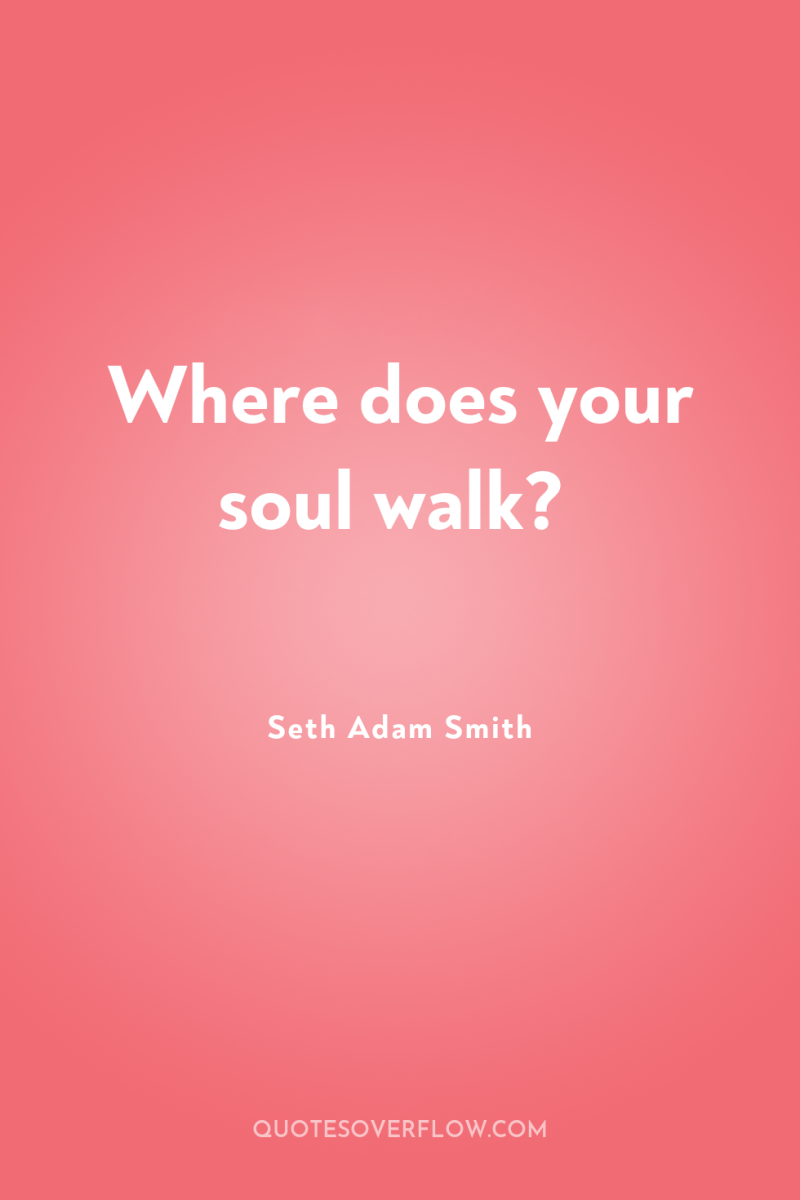
89
Where does your soul walk?Seth Adam Smith
90
A person with low standards will forever be walking. A person with high standard will soon stop walking and start running. Later, they’ll soon stop running and start galloping. The next time you see him, he’s either flying or soaring.Israelmore Ayivor
91
If the body is the register of the real, then reading with one's feet is real in a way reading with one's eyes alone is not.Rebecca Solnit
92
..the act of remembering is imagined as a real act, that is, as a physical act: as walking..the means of retrieving the stored information was walking through the rooms like a visitor in a museum..to walk the same route again can mean to think the same thoughts again, as though thoughts and ideas were indeed fixed objects in a landscape one need only know how to travel through. In this way, walking is reading, even when both the walking and reading are imaginary, and the landscape of the memory becomes a text as stable as that to be found in the garden, the labyrinth, or the stations.Rebecca Solnit
93
This is what is behind the special relationship between tale and travel, and, perhaps, the reason why narrative writing is so closely bound up with walking. To write is to carve a new path through the terrain of the imagination, or to point out new features on a familiar route. To read is to travel through that terrain that the author as guide - a guide one may not always agree with our trust, but who can at least be counted upon to take one somewhere. I have have often wished that my sentences could be written out as a single line running into distances so that it would be clear that a sentence is likewise a road and reading is traveling. .Rebecca Solnit
94
The spirit of the way is surely there, in the wish to wander through the world in order to escape it and to find others where there is nobody.JeanChristophe Rufin
95
All truly great thoughts are conceived while walking.Friedrich Nietzsche
96
Yes, if the stones that we walked on could talk, they would surely tell our story.Nico J. Genes
97
I only went out for a walk and finally concluded to stay out till sundown, for going out, I found, was really going in.John Muir
98
Go outside. Don’t tell anyone and don’t bring your phone. Start walking and keep walking until you no longer know the road like the palm of your hand, because we walk the same roads day in and day out, to the bus and back home and we cease to see. We walk in our sleep and teach our muscles to work without thinking and I dare you to walk where you have not yet walked and I dare you to notice. Don’t try to get anything out of it, because you won’t. Don’t try to make use of it, because you can’t. And that’s the point. Just walk, see, sit down if you like. And be. Just be, whatever you are with whatever you have, and realise that that is enough to be happy. There’s a whole world out there, right outside your window. You’d be a fool to miss it.Charlotte Eriksson
99
Perhaps walking is best imagined as an 'indicator species, ' to use an ecologist's term. An indicator species signifies the health of an ecosystem, and its endangerment or diminishment can be an early warning sign of systemic trouble. Walking is an indicator species for various kinds of freedom and pleasures: free time, free and alluring space, and unhindered bodies.Rebecca Solnit
100
[In mountaineering, if] we look for private experience rather than public history, even getting to the top becomes an optional narrative rather than the main point, and those who only wander in high places become part of the story.Rebecca Solnit